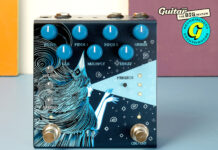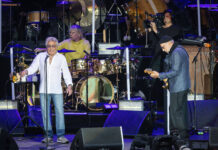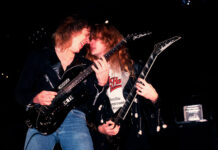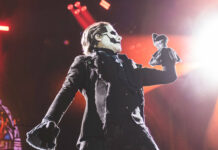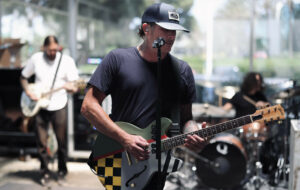
“People thought I was crazy. I was doing things that were ambitious”: Tom DeLonge on UFOs and the return of Angels & Airwaves
We come with a self-destruct button. For some of us it’ll remain factory sealed. Others will, at some point, press it. These days, Tom DeLonge just does what he wants without consulting the broken remains of a device he’s spent decades hitting.
READ MORE: “We used to play obtusely technical things. That’s not interesting to us now”: Dustin Kensrue on Thrice’s musical evolution
Twenty years ago he was the guitarist and vocalist in what some consider to be the first punk band to have a number one album in the US. In 2001, Blink-182’s Take Off Your Pants and Jacket went platinum at a moment when a certain style of sophomoric pop-punk became one of the major currencies in popular music.
Since then he’s quit Blink twice, having unintentionally created a fissure in the band by forming his post-hardcore side project Box Car Racer in the wake of TOYPAJ’s success, and then launched Angels & Airwaves when Blink went on ‘indefinite hiatus’ in 2005 – the synth-rock group’s gleaming new LP Lifeforms is their sixth full-length. He also makes movies, writes books and, almost inconceivably, he has become a mouthpiece for the UFO-curious in a manner that has led to many, many unkind headlines. “Blink-182’s Tom DeLonge Has Officially Gone Batshit Insane.” That sort of stuff.
Two years ago, though, the US Navy admitted that videos of “unidentified aerial phenomena” published by the New York Times and To the Stars Academy of Arts & Sciences, an organisation co-founded by DeLonge, were legit. In a recent podcast his former bandmate Mark Hoppus, who is currently undergoing treatment for cancer, described him as “fearless”. “I attribute everything to my quest to follow my heart and soul regardless of what people understand or what they like,” DeLonge says. “If I didn’t have that I would be complacent.”
“I’ve put myself out there so many times, and I’ve been properly misunderstood in public for so many things, that I love it because I don’t care,” he adds. “People know that I’m unpredictable. They also know that I’m pretty clever and they also know now that, holy shit, maybe he’s not fuckin’ crazy. In that whole time, when people thought I was crazy or that I was some problem child – maybe I am – I was actually learning and doing things that were ambitious.”
Signs of life
Lifeforms is an interesting beast in this context. As much as it’s another uber-slick slice of Depeche Mode-meets-U2 pop-rock, in songs such as the driving Euphoria and Restless Souls, a dead ringer for Untitled-era Blink, it also has a prominent seam of bratty, vibrant punk energy. In tandem with drummer-multi-instrumentalist Ilan Rubin, who shouldered a share of the final tracking and added key elements to songs that had been three years in the workshop, DeLonge charges into hooks and slams his signature Gibson ES-333 into maximum crunch power chords.
“When you start out as a punk band, you’re playing fast,” DeLonge observes. “Usually, the way you’d progress your songwriting is by slowing down. Angels & Airwaves, we were in the middle. The choice on this record, at least in the beginning, was to go more raw. I wanted to go in a direction that was not as saturated, produced, and wasn’t so atmospheric.
Image: Jonathan Wiener
“But through that three-year journey, I was like ‘Shit, I really want these all to sound different.’ I don’t want every song to sound like Euphoria. I was like, ‘How do we really celebrate all the things I grew up on?’ Like the Cure and all the punk rock bands. What you have is a journey through all my favourite stuff. I make these records for myself.”
Lifeforms is another textural expedition that opens clear water between itself and the idea of DeLonge as a three-chord thrasher. “In my earlier years with Blink it was, ‘How do I create tones that let these songs sound different from each other?’ But all I was using was a distortion pedal and every once in a while a flanger,” he says. “Now, in Angels & Airwaves, there are delay pedals and synthesizers and organic oscillations from fuckin’ modular synths. I craft songs by what’s needed, not what I’m limited to. That’s the biggest difference.”
Image: Kevin Trout
Something that hasn’t changed is his utilitarian approach to modding guitars. Back in the day he played a Strat that had more stickers than pickups by a rough ratio of 20 to one. His ES-333 is the same way. It has one Dirty Fingers humbucker at the bridge, and one volume knob. “I’m always using that guitar. It’s so versatile,” he says. “When I made it, I was very much trying to come up with a guitar that can be used in a live environment, that works for clean tones and dirty tones and everything in the middle. But in the studio we work really fast. I lay down these songs and want to move, move, move. That guitar ends up being a huge component of that.”
“when people thought I was crazy – and maybe I am – I was learning and doing things that were ambitious”
“When I first started playing, the Stratocaster just seemed like a cool looking guitar,” he adds. “I took out all the pickups, just had one pickup and one knob. I was a punk rock kid. But then later on I realised, ‘Well, fuck, this guitar looks like a violin on me.’ I’m six foot four. I went after the hollowbody. It fits me in scale and vibe. I did the same thing and took out all the knobs and switches and pickups – all this bullshit that does not matter. Just turn it up and go. I found a pickup that works really well, and I haven’t strayed from it since.”
Angels & Airwaves (l-r): Ilan Rubin, drums; Matt Rubano, bass; Tom DeLonge, lead vocals, guitar; David Kennedy, guitar. Image: Jonathan Wiener
Just turn it up and go is more of a philosophy than a reality. With an audible air of resignation and regret, DeLonge’s days of messing around with mic placements and stacks of pedals are largely behind him. “It’s so different now because of amp and speaker modelling,” he admits. “We do it all in the box. We’re able to change it all the way up to the mix. You can back off the distortion. We’re re-amping a lot of guitars, then we transfer into the Axe-Fx stuff, because that’s where it all lives these days. Using pedals and amplifiers… it’s sad but it’s just not needed anymore.
“It just creates a headache because you can’t duplicate things exactly. There’s always a loss of signal when you’re trying to amp it up every other night on stage. It’s also super expensive and heavy to ship around, those speaker cabinets weigh a thousand pounds each, you know? Plugging a guitar into an amplifier and turning it up? There’s nothing better. But for the professionalism of music it is just not needed.”
Image: Kevin Trout
West Coast sound
DeLonge’s youth was spent causing trouble with a skateboard beneath his feet in Poway, California, some 20 miles or so north of San Diego. As his wheels crisscrossed the city’s asphalt he gorged on the foundational sounds of west coast punk rock, from Descendents through All, to Bad Religion, TSOL, NOFX, and the noise coming out of the East Bay.
“They went together, it was one culture,” he says. “The whole scene was really full of a punk rock ethos. At the time skateboarding, wherever you did it, was against the law. You weren’t in the Olympics. There weren’t skateparks everywhere. It was a very countercultural, rebellious thing. There’s an element of danger, there’s an element of breaking the law, and there’s an element of individuality. That is a big piece of who I am.”
Image: Kevin Trout
It was up the coast, in Portland, that his eyes were opened to punk for the first time, though. While visiting a friend he spent hours upon hours hunkered down with nothing but a guitar and a handful of records for company. It knocked his world clean off its axis. “I’m in seventh grade,” he recalls. “My friend goes to school during the day. They were like, ‘You can hang with him at school if you want?’ I tried that for one day and it was the dumbest thing I ever did. It was so weird.
“So I stayed at his house until he got out. I looked at the guitar and thought, ‘How does this thing work?’ I spent about three days playing his guitar and three records: Dinosaur Jr, All and Stiff Little Fingers. The very first time I picked up a guitar, I didn’t just try to hit notes, I tried to write something, which is the strangest thing. That’s like picking up a calculator and going, ‘I’m going to figure out an equation.’ But my fingers wouldn’t do what my brain wanted them to. It pissed me off. I had to figure it out, and make my fuckin’ fingers do it. Then I wrote my first song. I still remember the riff to this day.”
Since his friends at the church his mother made him attend clubbed together with $40 for a garage sale six string, DeLonge says he has played guitar every day of his life.
Tom DeLonge playing his signature ES-333 on stage with Angels & Airwaves. Image: Kevin Trout
Scat men
Blink-182 formed in 1992, when he was introduced to Hoppus. In harness with drummer Scott Raynor they hit upon a blend of scatalogical, hyper-melodic punk almost immediately. Their Buddha demo cassette made waves locally and opened doors for them to climb the rungs in the wake of Green Day, the Offspring and Rancid’s commercial explosion. By 2001, they were one of the biggest bands on the planet.
DeLonge, Hoppus and human drum machine Travis Barker, who replaced Raynor in 1998, took the blueprint laid out by Blink’s 1997 single Dammit and spun solid gold in the form of 1999’s Enema of the State. It shifted five million copies and its sleeve, featuring porn star Janine Lindemulder, became emblematic of a pervading frattiness in pop culture. Blink and the bands that were carried along in their wake would become the catchy soundtrack to American Pie and the scores of raunchy teen comedies that came after it, creating a weird kind of multi-media synergy.
Image: Kevin Trout
In following it up, Blink made Take Off Your Pants and Jacket, an album that appears at this remove like something of a full stop on the whole thing. Produced by the late Jerry Finn, it pushed that era of pop-punk to a logical extreme, taking a surgical approach to realising songs that brimmed with snot and hurt amid the dick jokes. Blink never created anything like it again and DeLonge thinks that few others have come close either, for one good reason.
“When you find a vibration that speaks to you, it can change the way you think. This is group-consciousness stuff”
“We weren’t a mainstream pop-punk band,” he says. “We were touring for seven years with bands like Guttermouth and the Vandals. We were coming from a more raw, unfiltered, unproduced scene. Those attributes are in our DNA, regardless of how big Enema… got. People were putting us up and thinking we were a boyband. We didn’t get it. We were like, ‘What the fuck is going on?’ A week ago we’re lighting drumsticks on fire in our ass on stage and then people think we’re supposed to be on MTV dancing around.
Image: Kevin Trout
“On that record, I remember specifically the things that appealed to us were, ‘What’s NOFX doing? What’s Fugazi doing? What’s Propagandhi doing, or the Queers?’ Just cool shit that’s raw, where you can hear the guitars. You can hear the angst. You can hear the ‘Fuck off, what I’ve been doing is cooler than what you’ve been doing.’ You don’t hear that now in pop-punk bands. They do vocal acrobatics or they fuckin’ have lots of electronics that disguise everything. We were trying to be very clever with three instruments, coming from a place that was all angst and breaking the law and growing up in broken families. That’s what you hear.”
Image: Jonathan Wiener
Formative moments
Lifeforms is the work of a musician who still feels connected to these emotions, and the mile markers they represent in his life. DeLonge can look back at Box Car Racer and appreciate the rush of standing alone on a precipice. He can understand the hurt it caused when Barker hopped aboard and Hoppus did not. He can draw a straight line from its brooding dynamics to the chug of Euphoria. “I’m aware of what we did, I am aware of what that was,” DeLonge says. “It was extremely important for me as an artist. Blink was getting so big and people were pigeonholing us as this pop thing. I wanted to make sure that I was creating things that are reflective of who I really am, not just who people think I am.
“When we released Euphoria, that was specifically me saying, ‘Here’s Box Car Racer.’ This is needed at this point in my career – to revisit what I had, and what we did, and try to do something new off a foundation where I’m respecting what I did in the past. I was remembering those eras in my songwriting where I felt I was in touch with something that was pretty cool.”
There’s something in that sentiment. Lifeforms comes across like a synthesis of the multi-hyphenate DeLonge of 2021 and the kid who made it out of Poway on the back of his chemistry with another punk kid who happened to play bass. There are big ideas here – God, human purpose, the future – but they’re delivered alongside hooks that subscribe to the “nursery rhymes on crystal meth” maxim of early Blink. It’s about clear communication.
“I’m a big believer that when you find a vibration that speaks to you, it can change the way you feel, the way you think,” DeLonge says. “That’s why you have bands that come out and people start dressing like them, and thinking like them. They discover something about themselves because of a band they discovered. This is group consciousness stuff. This is resonating with other lifeforms. This is the ingredients and math of the universe.”
Angels & Airwaves’ Lifeforms is out now through Rise Records.
The post “People thought I was crazy. I was doing things that were ambitious”: Tom DeLonge on UFOs and the return of Angels & Airwaves appeared first on Guitar.com | All Things Guitar.
Source: www.guitar-bass.net

